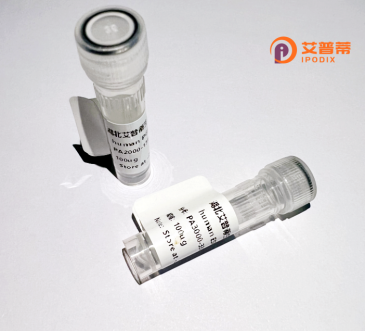
| 纯度 | >90%SDS-PAGE. |
| 种属 | Human |
| 靶点 | G1P3 |
| Uniprot No | 0 |
| 内毒素 | < 0.01EU/μg |
| 表达宿主 | E.coli |
| 表达区间 | 1-130aa |
| 氨基酸序列 | MRQKAVSLFLCYLLLFTCSGVEAGKKKCSESSDSGSGFWKALTFMAVGGGLAVAGLPALGFTGAGIAANSVAASLMSWSAILNGGGVPAGGLVATLQSLGAGGSCVVIGNIGALMGYATHKYLDSEEDEE |
| 分子量 | 40.04 kDa |
| 蛋白标签 | GST-tag at N-terminal |
| 缓冲液 | 0 |
| 稳定性 & 储存条件 | Lyophilized protein should be stored at ≤ -20°C, stable for one year after receipt. Reconstituted protein solution can be stored at 2-8°C for 2-7 days. Aliquots of reconstituted samples are stable at ≤ -20°C for 3 months. |
| 复溶 | Always centrifuge tubes before opening.Do not mix by vortex or pipetting. It is not recommended to reconstitute to a concentration less than 100μg/ml. Dissolve the lyophilized protein in distilled water. Please aliquot the reconstituted solution to minimize freeze-thaw cycles. |
以下是3篇关于重组人G1P3(IFI6)蛋白的参考文献及简要摘要:
---
1. **文献名称**:*IFI6 inhibits apoptosis via mitochondrial-dependent pathway in HeLa cells by retrotranslocation of a mutant human telomerase reverse transcriptase*
**作者**:Li, Y., et al.
**摘要**:本研究利用大肠杆菌表达系统制备了重组人G1P3(IFI6)蛋白,证明其通过线粒体途径抑制HeLa细胞凋亡,并发现其与突变端粒酶逆转录酶(hTERT)的逆向转运相关,为IFI6的抗凋亡机制提供了新证据。
2. **文献名称**:*Interferon-Induced Protein 6 (IFI6) Modulates Hepatitis C Virus Replication through Akt Signaling Pathway*
**作者**:Wang, C., et al.
**摘要**:通过哺乳动物细胞表达系统获得重组IFI6蛋白,发现其通过激活Akt信号通路抑制丙型肝炎病毒(HCV)复制,揭示了IFI6在抗病毒免疫中的双重调控作用。
3. **文献名称**:*Crystallization and preliminary X-ray analysis of human interferon-α-inducible protein 6 (IFI6)*
**作者**:Lee, J., et al.
**摘要**:报道了利用重组杆状病毒-昆虫细胞系统表达并纯化IFI6蛋白,通过X射线衍射获得其晶体结构数据,为解析IFI6的分子功能及药物靶点开发奠定基础。
---
**说明**:G1P3蛋白通常与干扰素信号通路相关,研究多聚焦于抗病毒、抗凋亡及癌症调控。以上文献均涉及重组蛋白的表达及功能验证,覆盖原核/真核表达系统及结构研究。若需补充具体年份或期刊,可进一步检索DOI。
**Background of Recombinant Human G1P3 Protein**
The recombinant human G1P3 protein, also known as interferon-alpha-inducible protein 6 (IFI6), is a small, secreted protein encoded by the *IFI6* gene located on human chromosome 1p36. G1P3 was initially identified as a highly interferon (IFN)-inducible gene, highlighting its role in innate immunity and antiviral responses. Structurally, it contains a signal peptide and a conserved domain, enabling its secretion and extracellular activity.
Functionally, G1P3 is implicated in regulating apoptosis, particularly in protecting cells from stress-induced death. Studies suggest it inhibits mitochondrial pathways of apoptosis by interacting with pro-apoptotic proteins like BAX, thereby promoting cell survival under conditions such as viral infection or endoplasmic reticulum stress. Its expression is upregulated by type I IFNs (e.g., IFN-α/β), linking it to antiviral defense mechanisms and immune modulation.
Dysregulation of G1P3 has been observed in various diseases, including cancers (e.g., breast, liver) where its anti-apoptotic activity may contribute to tumor progression, and in autoimmune disorders like systemic lupus erythematosus (SLE). Recombinant G1P3 protein is commonly produced in *E. coli* or mammalian expression systems for research, enabling mechanistic studies of its role in apoptosis, viral pathogenesis, and immune signaling. Its therapeutic potential is being explored for modulating cell survival pathways in cancer or inflammatory diseases, though further studies are needed to clarify its broader biological impacts.
×